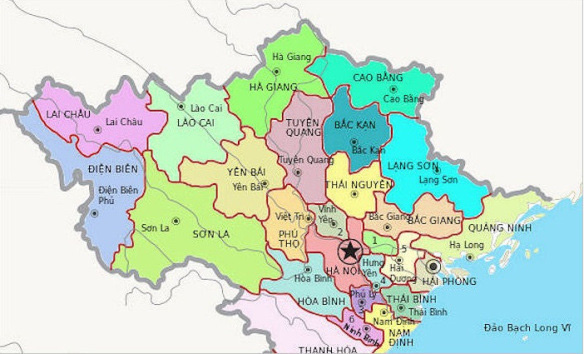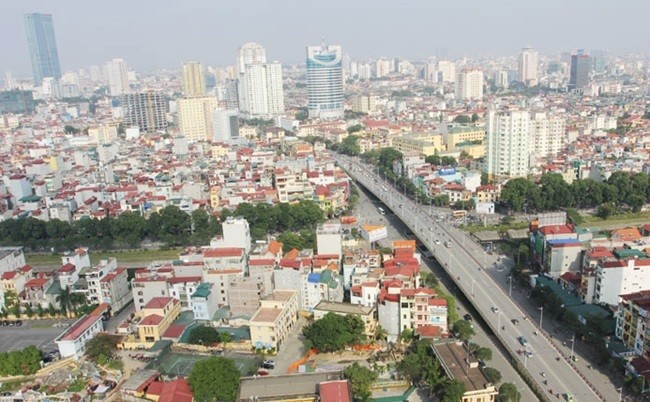Division of administrative units of the Socialist Republic of Vietnam
What are the regulations on the division of administrative units of the Socialist Republic of Vietnam? - Thanh Thao (Kien Giang, Vietnam)

Division of administrative units of the Socialist Republic of Vietnam (Internet image)
Regarding this issue, LawNet would like to answer as follows:
1. Division of administrative units of the Socialist Republic of Vietnam
According to Article 110 of the Constitution 2013, the administrative units of the Socialist Republic of Vietnam shall be defined as follows:
- The country shall be divided into provinces and centrally run cities; A province shall be divided into rural districts, towns, and provincial cities; a centrally run city shall be divided into urban districts, rural districts, towns, and equivalent administrative units;
- A rural district shall be divided into communes and townships; a town or provincial city shall be divided into wards and communes; and an urban district shall be divided into wards.
- Special administrative-economic units may be established by the National Assembly.
The establishment, dissolution, consolidation, separation or adjustment of the boundaries of, an administrative unit must be consulted with local People and must comply with the process and procedures prescribed by a law.
2. Local government in Vietnam
Article 111 of the Constitution 2013, local administrations shall be organized in administrative units of the Socialist Republic of Vietnam.
- Local administration levels composed of the People’s Council and People’s Committee shall be organized consistent with the characteristics of the rural areas, urban areas, islands or special administrative-economic units prescribed by a law.
3. Tasks of local government in Vietnam
- Local administrations shall organize and ensure implementation of the Constitution and law in their localities; decide on local issues prescribed by a law; and submit to the examination and supervision by state agencies at higher levels.
- The tasks and powers of local administrations shall be determined on the basis of determining the powers between state agencies at the central and local levels and for each level of local administration.
- Local administrations may, as necessary, be assigned certain tasks of state agencies at higher levels, along with the necessary means to ensure the performance of those tasks
4. People's Council and People's Committee in Vietnam
- The People’s Council is the local state power body, representing the will, aspirations and right to mastery of the local People, shall be elected by the local People, and is responsible to the local People and state agencies at higher levels.
The People’s Council shall decide on local issues as prescribed by a law; and supervise the observance of the Constitution and law in its locality and the implementation of its own resolutions.
- The People’s Committee at a local administration level, which shall be elected by the People’s Council of the same level, is the executive body of the respective People’s Council and is the local state administrative body, and is responsible to the People’s Council and state administrative agencies at higher levels.
The People’s Committee shall organize implementation of the Constitution and law in its locality and implementation of the resolutions of the People’s Council, and perform the tasks assigned to it by state agencies at higher levels.
(Based on Article 113, 114 of the Constitution 2013)
5. Who is People’s Council deputy?
Article 115 of the Constitution 2013 stipulates that a People’s Council deputy shall represent the will and aspirations of local People; shall maintain close ties with voters and be subject to their supervision, meet and report to voters on his or her own activities and activities of the People’s Council, respond to their requests and petitions; and consider and press for the settlement of complaints and denunciations.\
A People’s Council deputy has the task of mobilizing the People to implement the Constitution, law, policies of the State, and resolutions of the People’s Council, and encouraging the People to participate in the state management.
A People’s Council deputy has the right to raise questions to the Chairperson or other members of the People’s Committee, Chief Justice of the People’s Court, Chief Procurator of the People’s Procuracy, and Heads of the agencies of the People’s Committee. The questioned persons shall present their answers before the People’s Council.
A People’s Council deputy has the right to make proposals to state agencies, organizations, and units in the locality. The heads of those agencies, organizations or units shall receive the deputy, then consider and resolve the issues raised in his or her proposals.
- Key word:
- administrative units in Vietnam
- Cases of land rent exemption and reduction under the latest regulations in Vietnam
- Economic infrastructure and social infrastructure system in Thu Duc City, Ho Chi Minh City
- Regulations on ordination with foreign elements in religious organizations in Vietnam
- Increase land compensation prices in Vietnam from January 1, 2026
- Determination of land compensation levels for damage during land requisition process in Vietnam
- Who is permitted to purchase social housing according to latest regulations in Vietnam?
-

- Requirements for establishment, merging, splitting ...
- 09:06, 23/05/2023
-

- Regulations on classification of administrative ...
- 16:40, 11/11/2022
-

- Notable new policies of Vietnam effective as of ...
- 16:26, 11/04/2025
-
.Medium.png)
- Notable documents of Vietnam in the previous week ...
- 16:21, 11/04/2025
-
.Medium.png)
- Notable documents of Vietnam in the previous week ...
- 16:11, 02/04/2025
-
.Medium.png)
- Notable new policies of Vietnam to be effective ...
- 16:04, 02/04/2025
-
.Medium.png)
- Notable new policies of Vietnam effective from ...
- 14:51, 21/03/2025

 Article table of contents
Article table of contents
